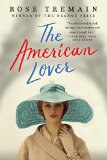Summary | Excerpt | Reading Guide | Reviews | Beyond the Book | Readalikes | Genres & Themes | Author Bio

She says to Rosalita: 'It was a kind of dream.'
She can't remember a summer season to the dream; only a cold spring arriving and the great grey allées of horse chestnut trees clothing themselves with green. There used to be a sequence of photographs of her, leaning out over the churning river in that same springtime, with her hair cut short like Jean Seberg, but these have been put away somewhere and their hiding place forgotten.
She can remember being ill for a while with la gripe. Fred came round, bringing an old fur coat, and covered her with this. Then Thad and Fred stood at the window, silhouetted against the wan light of day, and Beth could see them thinking, What is to be done now? – as though all human activity had come to a sudden end. And she knew that they would soon arouse each other by deft, secretive means and ask her to watch whatever they decided to do next. But she closed her eyes and breathed in the scent of mothballs on the fur and knew that she was drifting far away on a tide of naphthalene. She tells Rosalita: 'I can remember that feeling of floating out of my life, while fellatio was taking place.' And Rosalita crosses herself and whispers: 'Such things you have seen. Try to forget them now.'
She wants to forget them, but she can't. She says to Rosalita, 'Tell me something else about Setúbal and the matadors.' Rosalita replies that she should really get on and clean the bathroom, but then she goes to her bag and takes out a photograph of a young man in a matador costume. It's a faded picture, but the weight of gold sequins on the shoulder pads still cast a spangled luminescence onto the soft skin of the young man's face.
'My brother,' says Rosalita quietly. Then she lights a cigarette and sighs and inhales and explains: 'In Portugal we don't kill the bulls. We say there is no need for this blood. The cavaleiros on horseback stab them with bandarilhas and the forcados tease them until they are still.'
'And then what happens?'
'Then the matadors must come and risk their lives against them. Instead of killing with a sword, they stab with one last bandarilha. But a bull does not know it is not going to be killed. It will try to wound the matador with its horns. And this is what happened.'
'To your brother? He was wounded.'
'Yes. Antonio. You see how beautiful he was. More beautiful than me. He died of his wounds. And I see my parents thinking, It should have been Rosalita who was taken from us, not Antonio. So this is when I left Portugal and came to England.'
Beth is silent. She reaches out and holds Rosalita's hand.
Thaddeus and Beth came back from Paris. Perhaps it was summer by then, or autumn. Seasons are of no account in the way Beth remembers what happened next. It just happened in time, somewhere, and altered everything.
She became pregnant. She knew she would have to move out of her parents' flat; her father wouldn't tolerate her presence any more, once he knew her story.
While he and her mother were at work, she packed two suitcases with everything she owned, which came down to very little, just a few nice clothes, including a grey sleeveless dress from Mary Quant and four pairs of high-heeled boots. Pressed in among these things was the notebook she'd taken to Paris, which was meant to be full of notes towards a novel, but which contained no notes at all, only ink drawings of Thaddeus and Fred and of the dilapidated bedroom window, beyond which strange creatures floated in the Parisian sky: winged lambs, feathered serpents.
There were a few other things. A copy of Le Petit Prince by Saint-Exupéry and Tolstoy's Anna Karenina. There was a wooden tennis racket and two silver cups she'd won at school – one for being tennis champion, the other for 'good citizenship'. She would have left these behind but for the sentimental idea that she might one day show them to her child and the child might laugh and be proud.
Excerpted from The American Lover by Rose Tremain. Copyright © 2015 by Rose Tremain. Excerpted by permission of W.W. Norton & Company. All rights reserved. No part of this excerpt may be reproduced or reprinted without permission in writing from the publisher.
Your guide toexceptional books
BookBrowse seeks out and recommends the best in contemporary fiction and nonfiction—books that not only engage and entertain but also deepen our understanding of ourselves and the world around us.